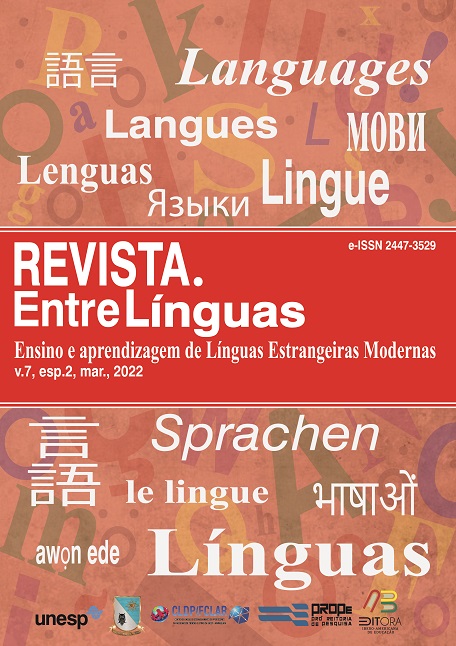Syntagmatic patterns of a native language as a factor of phonetic interference
DOI:
https://doi.org/10.29051/el.v8iesp.2.17318Keywords:
Foreign accent, Phonetic interference, Positional patterns, Teaching Russian as a foreign languageAbstract
The article considers a foreign accent in Russian speech and develops methods for its reduction. It is necessary to compare positional patterns in two "contacting" systems. When teaching foreign students the Russian prosody, it is important to take into account that positional patterns in the Russian language are mainly conditioned by the positional change of sounds, and such patterns in the native language of students can be determined by the restriction on their use in specific positions caused by the limited distribution of phonemes. The positional patterns of the Russian language are thoroughly studied in the courses of Russian sounding speech but little attention is paid to the positional patterns of the native language of foreign students in the process of teaching the Russian phonetics. All of the above determines the need to consider the positional analysis of "contacting" phonetic systems when creating nationally oriented courses in practical phonetics.
Downloads
References
ALBERTOVSKAYA, E.; GÜRSOY, E. Sprachbeschreibung Russisch. Kompetenzzentrum ProDaZ, 2010. Available in: http://www.uni-due.de/imperia/md/content/prodaz/rus.pdf. Access in: 23 Aug. 2021.
AVANESOV, R. I. Fonetika sovremennogo russkogo literaturnogo yazyka [The phonetics of the Russian literary language]. Moscow, 1956.
BARKHUDAROVA, E. L. Metodologicheskie problemy analiza inostrannogo aktsenta v russkoi rechi [The methodological issues of analyzing a foreign accent in the Russian speach]. Vestnik MGU, n. 6., p. 57-70, 2012. Available in: https://cyberleninka.ru/article/n/metodologicheskie-problemy-analiza-inostrannogo-aktsenta-v-russkoy-rechi. Access in: 17 Feb. 2021.
BARKHUDAROVA, E. L. Paradigmatika i sintagmatika zvukovykh edinits v kontekste obucheniya russkomu proiznosheniyu [The paradigmatics and syntagmatics of sound units for teaching the Russian pronunciation]. Vestnik MGU., n. 4, p. 39-50, 2011. Available in: https://cyberleninka.ru/article/n/paradigmatika-i-sintagmatika-zvukovyh-edinits-v-kontekste-obucheniya-russkomu-proiznosheniyu. Access in: 17 Feb. 2021.
BARKHUDAROVA, E. L.; FOKINA, M. V. “Pozitsionnyi” aktsent: Analiz i praktika obucheniya proiznosheniyu ["Positional" accent: the analysis and practice of teaching pronunciation]. Izvestiya Yugo-Zapadnogo gos. un-ta. Ser. Lingvistika i pedagogika, v. 1, n. 14, p. 105-115, 2015.
BERNSTEIN, S. I. Voprosy obucheniya proiznosheniyu primenitelno k obucheniyu russkomu yazyku inostrantsev [The issues of teaching pronunciation in relation to Russian as a foreign language]. Moscow, 1991.
FOKINA, M. V. Sistema raboty nad pozitsionnymi zakonomernostyami russkoi foneticheskoi sistemy v inoyazychnoi auditorii [The system for processing positional patterns of the Russian phonetics in a foreign audience]. Saint Petersburg: MAPRYaL, 2019.
GORSHKOVA, K. V. O foneme v yazyke i rechi [On phonemes in language and speech]. Warsaw, 1980.
HAUGEN, E. Yazykovoi kontakt [Language contact]. Novoe v lingvistike: the collection of articles, n. 6, p. 61-80, 1972.
KASATKIN, L. L. Fonetika sovremennogo russkogo literaturnogo yazyka [The phonetics of the modern Russian literary language]. Moscow, 2003.
KHROMOV, S. S. Sovremennyi zvuchashchii diskurs v aspekte mezhkulturnoi kommunikatsii [Modern vocal discourse in the context of international communication]. Yaroslavskii pedagogicheskii vestnik, v. 1, n. 3, p. 161-165, 2012.
PANOV, M. V. Russkaya fonetika [The Russian phonetics]. Moscow, 1967.
PIROGOVA, N. K. Vokalizm i konsonantizm russkogo yazyka (sintagmatika, paradigmatika) [The vocalism and consonantism of the Russian language (syntagmatics and paradigmatics)]. 1985. Thesis (Doctor Degree in Philological Sciences) – Moscow, 1985.
RAEVSKII, M. V. Fonetika nemetskogo yazyka [The phonetics of the German language]. Moscow, 1997.
REFORMATSKY, A. A. Obuchenie proiznosheniyu i fonologiya [Teaching pronunciation and phonology]. Filologicheskie nauki, n. 2, p. 145-156, 1959.
SHUTOVA, M. N. Korrektirovochnyi kurs russkoi fonetiki dlya inostrannykh studentov-stazherov Gos. IRYa im. A.S. Pushkina [The correcting course of the Russian phonetics for foreign students at the Pushkin State Russian Language Institute]. Russkii yazyk za rubezhom, v. 3, p. 4-9, 2017.
SHUTOVA, M. N.; OREKHOVA, I. A. Foneticheskii aspekt v metodike prepodavaniya RKI [Phonetic aspects in teaching Russian as a foreign language]. Vestnik RUDN., v. 16, n. 3, p. 261-278, 2018.
VASILEVA, N. V.; VINOGRADOV, V. A.; SHAKHNAROVICH, A. M. Kratkii slovar lingvisticheskikh terminov [The abridged dictionary of linguistic terms]. Moscow, 1995.
VINOGRADOV, V. A. Konsonantizm i vokalizm russkogo yazyka (Prakticheskaya fonologiya) [The consonantism and vocalism of the Russian language (practical phonology)]. Moscow, 1971.
ZINDER, L. R. Teoreticheskii kurs fonetiki sovremennogo nemetskogo yazyka [The theoretical course of the modern German phonetics]. Moscow, 2003.
Published
How to Cite
Issue
Section
License

This work is licensed under a Creative Commons Attribution-NonCommercial-ShareAlike 4.0 International License.
Os manuscritos aceitos e publicados são de propriedade da Revista EntreLínguas. Os artigos publicados e as referências citadas na Revista EntreLínguas são de inteira responsabilidade de seus autores.
Transferência de direitos autorais – autorização para publicação
Caso o artigo submetido seja aprovado para publicação, já fica acordado que o(s) autor(es) autoriza(m) a UNESP a reproduzi-lo e publicá-lo na EntreLínguas, entendendo-se os termos “reprodução” e “publicação” conforme definição respectivamente dos incisos VI e I do artigo 5° da Lei 9610/98. O artigo poderá ser acessado pela rede mundial de computadores (Internet), sendo permitidas, a título gratuito, a consulta e a reprodução de exemplar do artigo para uso próprio de quem a consulta, desde que haja a citação ao texto consultado. Essa autorização de publicação 328 EntreLínguas, Araraquara, v. 1, n .2, p. 323-328, jul./dez. 2015 não tem limitação de tempo, ficando a UNESP responsável pela manutenção da identificação do(s) autor(es) do artigo. Os artigos publicados e as referências citadas na Revista EntreLínguas são de inteira responsabilidade de seus autores.











